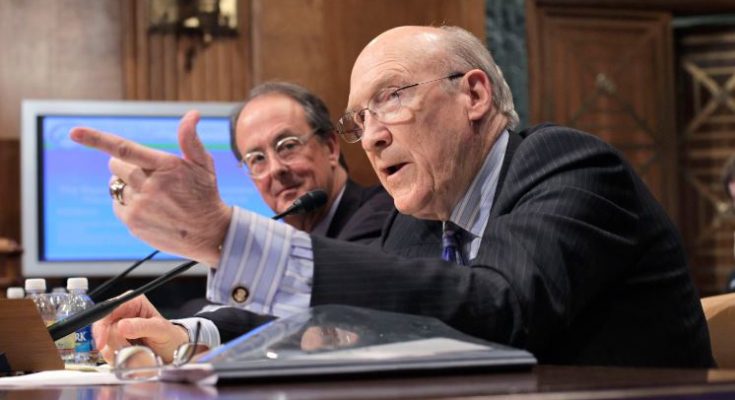Pushing the 1986 immigration reform bill through Congress — his major legislative accomplishment — was like “giving dry birth to a porcupine,” he quipped.
Mr. Simpson, who was first elected in 1978 and served 10 years as the GOP whip, had an unrivaled talent for leavening dry policy discussions with evocative aphorisms. “Don’t squat with your spurs on” was one favorite. Pushing the 1986 immigration reform bill through a reluctant Congress — his major legislative accomplishment — was like “giving dry birth to a porcupine.”
“Over the last 40 years, I have had my size 15 feet in my mouth a time or two,” he wrote in a 2010 apology for an email that suggested Social Security and other entitlement programs had turned the country into “a milk cow with 310 million tits.” An outspoken advocate for reining in entitlement spending, he often had harsh words for AARP and other senior-advocacy groups.
“Simpson turns out to be one of those refreshing breezes that occasionally gentles their way through the congressional pomp and fustian to remind that all is not lost,” The Washington Post reported after the senator’s first year on Capitol Hill.
Mr. Simpson’s standing did not rest on solely his down-home persona — or his imposing physical presence. At 6-foot-7, he ranked as the tallest senator in modern history. (He lost the title in 2017 to 6-foot-9 Luther Strange of Alabama.)
Mr. Simpson earned bipartisan respect for his mastery of the nitty-gritty of legislating and his willingness to break from party orthodoxy. The late Robert C. Byrd of West Virginia, a longtime Democratic Senate leader, once called him “one of the most accomplished legislative craftsman to ever to grace” the Capitol.
Mr. Simpson was conservative on fiscal issues, the use of natural resources and the scope of government. He referred to opponents on the left as “bug-eyed zealots” and to environmentalists as “super-greenies.” But he was no ideologue.
“You have to learn how to compromise on an issue without compromising yourself,” he said, and he brought that approach to his second act in national politics — as co-chairman of President Barack Obama’s 2010 deficit-reduction commission. The other co-chairman was Erskine Bowles, who had served as President Bill Clinton’s chief of staff.
A majority of the 18-member panel endorsed a far-reaching mix of spending cuts, tax increases and reforms. The plan, which came to be known as Simpson-Bowles or Bowles-Simpson, received high marks as a clear-eyed prescription for stabilizing federal finances. But it contained bitter pills — including raising the Social Security retirement age and the federal gasoline tax — that drew stiff opposition.
He held the position until 1994, when Trent Lott of Mississippi challenged him and won the secret-ballot contest by a single vote — an outcome widely viewed as a reflection of the party’s move to the right on social issues.
It was Mr. Simpson’s only political defeat, and a painful one. Although he attributed his decision not to seek a fourth term in 1996 to a general loss of “fire in the belly,” his ouster from leadership was a factor. “I’d been to the mountaintop, and I knew I’d be hanging on in the foothills if I stayed,” he told a reporter.
Immigration, the issue with which Mr. Simpson was closely associated, came to him by chance. Wyoming had a small immigrant population, and Mr. Simpson had little interest in the matter when he was first elected. But in 1979, the Senate leadership needed a Republican for a national commission on immigration policy and tapped the Judiciary Committee’s junior member, the lanky newcomer from Wyoming.
Mr. Simpson was widely praised for pushing the highly fraught package across the finish line. The law, however, fell short of expectations.
Immigration was not the only factious matter in which Mr. Simpson had a noticeable presence.
In 1991, his aggressive defense of U.S. Supreme Court nominee Clarence Thomas against the sexual harassment charge of law professor Anita Hill drew widespread attention, much of it unfavorable, especially from women’s groups.
Hill, who had worked for Thomas at two federal agencies, alleged that he made lewd sexual comments to her; Thomas denied her account and denounced the televised hearings and media frenzy surrounding them as “a high-tech lynching.” The confrontation brought new prominence to the issue of workplace sexual harassment.
“That’s a very good question, and I’m sure that I cannot answer that to your satisfaction,” Hill replied. She cited fear of retaliation and damage to her career and said her response was not atypical of harassment victims.
Mr. Simpson later conceded that he had gone too far, telling a reporter, “I was ugly.”
Although the quotable Mr. Simpson received generally positive coverage from the news media, he was a harsh critic of journalists, contending that they were, for the most part, arrogant, lazy and fixated on the sensational. He detailed his grievances in a 1997 book, “Right in the Old Gazoo: A Lifetime of Scrapping with the Press.”
Son of politician
Alan Kooi Simpson was born in Denver on Sept. 2, 1931; his middle name was the surname of his maternal grandfather, a Dutch immigrant. He grew up in Cody in a family firmly rooted in Wyoming and the Republican Party. His father, Milward, was governor from 1955 to 1959 and a U.S. senator from 1962 to 1967. His older brother Peter was a state legislator and the GOP’s unsuccessful 1986 gubernatorial candidate.
After leaving the Senate, Mr. Simpson taught at Harvard University’s John F. Kennedy School of Government and directed the school’s Institute of Politics. In 2000, he returned to Wyoming and practiced law with his sons while remaining active in civic, cultural and charitable organizations in Wyoming and Washington. In 2022, he received the Presidential Medal of Freedom, the nation’s highest civilian honors, from President Joe Biden.
In December 2018, Mr. Simpson was one of four eulogists at the state funeral for his close friend, former president George H.W. Bush. Mr. Simpson’s lanky 87-year-old frame had become noticeably more stooped, but his way with words was well intact. Praising Bush for unfailing courage, loyalty, decency and “great humility,” Mr. Simpson added as an aside, “Those who travel the high road of humility in Washington, D.C., are not bothered by heavy traffic” — a line that brought a roar of laughter from Washington National Cathedral audience.
Summing up the former president’s character, Mr. Simpson used the same words he once suggested as a fitting epitaph for himself: “You would have wanted him on your side.”





